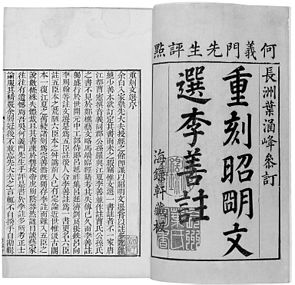
Back Wenxuan German Wen Xuan French מבחר הספרות של ג'או מינג HE 文選 (書物) Japanese 문선 Korean Вэнь сюань Russian Chiêu Minh văn tuyển Vietnamese 文選 Chinese 文選 ZH-CLASSICAL 文選 ZH-YUE
 An edition of the Wen Xuan printed around 1700 | |
| Author | (compiler) Xiao Tong, Crown Prince of Liang |
|---|---|
| Original title | 文選 |
| Wen xuan | |||||||||||||||||||||||||||||
|---|---|---|---|---|---|---|---|---|---|---|---|---|---|---|---|---|---|---|---|---|---|---|---|---|---|---|---|---|---|
 "Wenxuan" in Traditional (top) and Simplified (bottom) Chinese characters | |||||||||||||||||||||||||||||
| Traditional Chinese | 文選 | ||||||||||||||||||||||||||||
| Simplified Chinese | 文选 | ||||||||||||||||||||||||||||
| Literal meaning | "Selections of [Refined] Literature" | ||||||||||||||||||||||||||||
| |||||||||||||||||||||||||||||
The Wen Xuan ([wə̌n.ɕɥɛ̀n]; Chinese: 文選), usually translated Selections of Refined Literature, is one of the earliest and most important anthologies of Chinese poetry and literature, and is one of the world's oldest literary anthologies to be arranged by topic. It is a selection of what were judged to be the best poetic and prose pieces from the late Warring States period (c. 300 BC) to the early Liang dynasty (c. AD 500), excluding the Chinese Classics and philosophical texts.[1] The Wen Xuan preserves most of the greatest fu rhapsody and shi poetry pieces from the Qin and Han dynasties, and for much of pre-modern history was one of the primary sources of literary knowledge for educated Chinese.[2]
The Wen Xuan was compiled between AD 520 and 530 in the city of Jiankang (modern Nanjing) during the Liang dynasty by Xiao Tong, the eldest son of Emperor Wu of Liang, and a group of scholars he had assembled. The Liang dynasty, though short-lived, was a period of intense literary activity, and the ruling Xiao family ensured that eminent writers and scholars were frequently invited to the imperial and provincial courts.[3] As Crown Prince, Xiao Tong received the best classical Chinese education available and began selecting pieces for his new anthology in his early twenties. The Wen Xuan contains 761 separate pieces organized into 37 literary categories, the largest and most well known being "Rhapsodies" (fu) and "Lyric Poetry" (shi).
Study of the Wen Xuan enjoyed immense popularity during the Tang dynasty (618–907), and its study rivalled that of the Five Classics during that period. The Wen Xuan was required reading for any aspiring scholar and official even into the Song dynasty. Throughout the Yuan and Ming dynasties study of the Wen Xuan lapsed out of popularity, though the great philologists of the Qing dynasty revived its study to some extent.
Three volumes of the first full English translation of the Wen Xuan have been published by the American sinologist David R. Knechtges, professor emeritus of Chinese at the University of Washington, who aims to eventually complete the translation in five additional volumes.
- ^ Idema & Haft (1997), p. 112.
- ^ Knechtges (1982): 1.
- ^ Knechtges (1982): 4.
© MMXXIII Rich X Search. We shall prevail. All rights reserved. Rich X Search